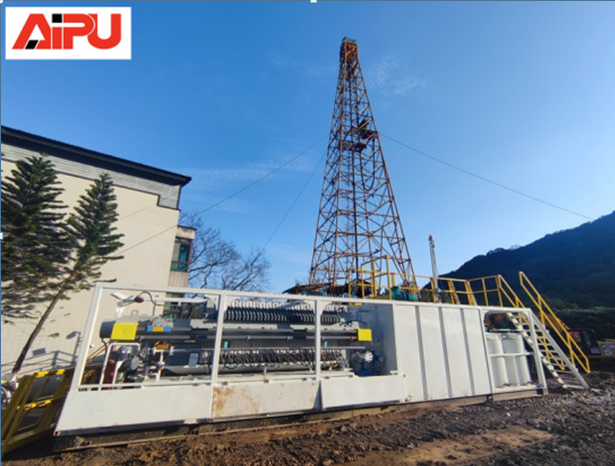Revolutionizing Drilling through State - of - the - Art Systems
Drilling operations are complex and require a high - level of safety and efficiency. One crucial component in achieving these goals is the solids control system. This system plays a vital role in maintaining the quality of drilling fluids and ensuring the safety of the entire drilling process.
Maintaining Drilling Fluid Quality
The primary function of a solids control system is to maintain the quality of drilling fluids. During the drilling process, various solids such as cuttings are introduced into the drilling fluid. If these solids are not removed, they can increase the density and viscosity of the drilling fluid. High - density and high - viscosity drilling fluids can cause excessive pressure in the wellbore, leading to well control issues. By removing these unwanted solids, the solids control system helps to keep the drilling fluid within the optimal range of density and viscosity, ensuring smooth drilling operations.
Protecting Drilling Equipment
Uncontrolled solids in the drilling fluid can cause significant damage to drilling equipment. Abrasive solids can wear down the internal components of pumps, valves, and drill bits. This not only shortens the lifespan of the equipment but also increases the risk of equipment failure during drilling. A solids control system filters out these abrasive solids, reducing the wear and tear on the equipment. As a result, the reliability of the drilling equipment is improved, and the frequency of maintenance and replacement is decreased, which ultimately saves time and cost.
Preventing Wellbore Instability
Wellbore instability is a major concern in drilling operations. Excessive solids in the drilling fluid can lead to the formation of a thick filter cake on the wellbore wall. This filter cake can cause differential sticking, where the drill string becomes stuck in the wellbore. Moreover, if the drilling fluid density is not properly controlled due to high solids content, it can cause wellbore collapse or formation damage. The solids control system helps to prevent these issues by removing excess solids, maintaining the correct fluid properties, and ensuring the stability of the wellbore.
Environmental Protection
Proper solids control is also essential for environmental protection. Drilling waste containing high levels of solids can be harmful to the environment if not properly managed. The solids control system separates the solids from the drilling fluid, allowing the fluid to be reused and reducing the volume of waste. The separated solids can then be treated and disposed of in an environmentally friendly manner. This not only reduces the environmental impact of drilling operations but also complies with strict environmental regulations.
In conclusion, the solids control system is an indispensable part of safe drilling operations. It maintains drilling fluid quality, protects equipment, prevents wellbore instability, and contributes to environmental protection. By investing in a high - quality solids control system, drilling companies can enhance safety, improve efficiency, and reduce costs.

Maintaining Drilling Fluid Quality
The primary function of a solids control system is to maintain the quality of drilling fluids. During the drilling process, various solids such as cuttings are introduced into the drilling fluid. If these solids are not removed, they can increase the density and viscosity of the drilling fluid. High - density and high - viscosity drilling fluids can cause excessive pressure in the wellbore, leading to well control issues. By removing these unwanted solids, the solids control system helps to keep the drilling fluid within the optimal range of density and viscosity, ensuring smooth drilling operations.
Protecting Drilling Equipment
Uncontrolled solids in the drilling fluid can cause significant damage to drilling equipment. Abrasive solids can wear down the internal components of pumps, valves, and drill bits. This not only shortens the lifespan of the equipment but also increases the risk of equipment failure during drilling. A solids control system filters out these abrasive solids, reducing the wear and tear on the equipment. As a result, the reliability of the drilling equipment is improved, and the frequency of maintenance and replacement is decreased, which ultimately saves time and cost.
Preventing Wellbore Instability
Wellbore instability is a major concern in drilling operations. Excessive solids in the drilling fluid can lead to the formation of a thick filter cake on the wellbore wall. This filter cake can cause differential sticking, where the drill string becomes stuck in the wellbore. Moreover, if the drilling fluid density is not properly controlled due to high solids content, it can cause wellbore collapse or formation damage. The solids control system helps to prevent these issues by removing excess solids, maintaining the correct fluid properties, and ensuring the stability of the wellbore.
Environmental Protection
Proper solids control is also essential for environmental protection. Drilling waste containing high levels of solids can be harmful to the environment if not properly managed. The solids control system separates the solids from the drilling fluid, allowing the fluid to be reused and reducing the volume of waste. The separated solids can then be treated and disposed of in an environmentally friendly manner. This not only reduces the environmental impact of drilling operations but also complies with strict environmental regulations.
In conclusion, the solids control system is an indispensable part of safe drilling operations. It maintains drilling fluid quality, protects equipment, prevents wellbore instability, and contributes to environmental protection. By investing in a high - quality solids control system, drilling companies can enhance safety, improve efficiency, and reduce costs.








